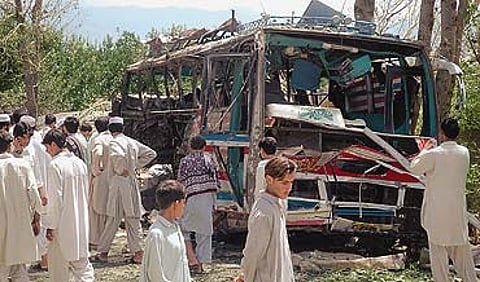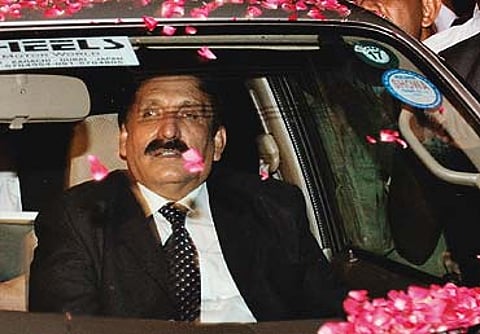Does Pakistan Need This Man?
It's a delicate, potentially epochal juncture. Amid the Islamists, the democrats and the West, the biggest variable is Musharraf.<a > Updates</a>
Some 200 people have been killed in militant attacks from the time the army besieged the Lal Masjid on July 3.
July 3: Explosion in Swat. Four killed.
July 4: Army convoy attacked by suicide bomber in North Waziristan. Eleven killed.
July 5: Police patrol vehicle in Peshawar ambushed, four killed. Another four die in a suicide attack in Swat.
July 6: General Musharraf’s airplane fired at, six pro-government tribal elders in North Waziristan abducted and killed.
July 8: Police party in Peshawar attacked by militants, four officers killed.
July 10: A DSP and 10 others killed in bomb explosion in Peshawar.

July 12: Eight die in a rocket attack at the Mingora bypass, NWFP.
July 13: Three pro-government tribal leaders killed by terrorists in North Waziristan.
July 14: A suicide bomber rams into a security convoy near Miranshah, 26 killed. Another three die in an explosion at the Bannu Airport, NWFP. An army officer killed in Balochistan.
July 15: Nineteen casualties in an attack on security forces by a suicide bomber. Another suicide bomber kills 26 police officials at the Dera Ismail Khan Police Lines.
July 17: A suicide bomber explodes himself, killing 16 more, at a meeting in Islamabad that was to be addressed by the suspended chief justice.
July 18: 20 soldiers of the Pakistan Army killed in North Waziristan.
July 19: 26 killed in a Taliban attack in Hub, Balochistan; another eight killed in a suicide bombing in Hangu, NWFP.
***
"I, Pervez Musharraf, with a sincere heart and God as mywitness, do solemnly swear that I will be faithful to the State of Pakistan and protectthe Constitution of Pakistan which reflects the wishes of the people of Pakistan. Further,I will not indulge in any political activity...."
—The oath Pervez Musharraf took on becoming the chief of the army staff, on October7, 1998
***
There’s no barometer to gauge whether Pakistanis believed the general’s explanation for arrogating absolute power to himself. But Musharraf did stretch credulity when, 12 days before he launched Operation Silence to smoke militants out of the Lal Masjid, he declared at a meeting of PML(Q) legislators, "Pakistan without me would be in deep crisis.... I’m not worried about myself, I’m concerned about your future."
However, the Lal Masjid crackdown and the ensuing retaliation by Islamists that has already killed 200 people provide Musharraf yet another opportunity to underscore his relevance in Pakistan’s polity. Even his detractors now wonder if the country actually needs Musharraf to check the rise of radical Islam, despite his illegitimate exercise of power and the gathering movement for restoration of democracy sparked by the suspension of Chief Justice Iftikhar Chaudhry. In response, others express astonishment, asking: Really, does Pakistan need Musharraf? Isn’t he the principal problem, rather than the solution?
Columnist Ayaz Amir, a former army officer himself, feels Musharraf is mistaken in equating the interests of the king’s party, and his own, with those of Pakistan. Amir says Musharraf can make gains, if through some miracle of vision and courage he restores democracy. "He will acquire more power and legitimacy than his army position ever gave him," he explains. "Musharraf is stuck in a halfway house, half-military ruler, half-constitutional head. It isn’t working, not for him, not for the country."

Amir says the army’s been part of Pakistan’s problem for quite long; a sagacious Musharraf can ensure he becomes part of the solution. How? "By taking two or three decisive steps back," says Amir. "The army has to realise that with the region aflame, Pakistan’s interests are best served by a return to democracy. Musharraf doesn’t have to be the victim of this restoration. He can be its father, leading the country to new vistas."
Politician Imran Khan says not only Pakistanis, even the international community has veered around to viewing Musharraf as the chief problem that besets his country. Khan lists his failures: he has not been able to control extremism and inflation, provide good governance, bridge the rich-poor divide. Worse, Khan adds, the incidence of rape has ballooned, as have attacks on churches; opposition leaders have been victimised, and discontent is brewing in the army. "Under these circumstances," says Khan, "Pakistan no more needs Musharraf who cares more about how he is perceived in the West than in implementing the policies he claims to espouse."
Musharraf’s fate crucially hinges on the perception of the West, says author Ahmed Rashid, about his relevance to its war on terror. He spells out the general’s pluses and minuses. "Since 9/11, he has always appeared as the ‘can-do’ authoritarian who has handed over hundreds of Al Qaeda prisoners to the US, positioned 80,000 troops on the Pak-Afghan border to stop Taliban incursions and made peace with India. His failures include allowing the Taliban leadership to resettle in Quetta, hammering out controversial peace deals with tribal extremists, and allowing Islamists to spread ideas of jehad and Sharia."
Rashid goes on to say that Musharraf’s twin policy on terrorists—nabbing those inimical to the US and appeasing others—has been rationalised by some Western diplomats as a consequence of him wanting to prove his indispensability in the war on terror and simultaneously remain sensitive to local specificities. This delicate balance has suffered a setback because of massive protests against Musharraf on the chief justice issue and the demand for democracy. Rashid, however, adds, "The US may like to see free and fair general elections in Pakistan, but not at the cost of Musharraf departing from the scene or plunging Pakistan’s crucial support—no matter how lukewarm—in the war on terrorism into uncertainty. So far, the West seems to have accepted Musharraf’s plea that democracy in Pakistan must be tailored to local conditions—in short, a democracy that keeps him in power rather than the global norm of democracy."
Others, however, locate Musharraf’s relevance in the worldwide matrix of Islamists challenging the modern state. Khaled Ahmed, consulting editor of The Friday Times, is one such person, who believes Musharraf has failed to counter this challenge because of the consequence of the Pakistani state promoting jehad through non-state warriors over 25 years, in an attempt to acquire "strategic depth" in Afghanistan and Kashmir. But if Musharraf hasn’t delivered, says Ahmed, democracy may deliver even less. He explains, "When the state requires a major exercise of its right to monopoly of violence, democracy may be unsuitable. Once the state weakens, it prompts the masses to seek security from elements other than the state, which negates democracy. This may lead to control of the state by the clergy with the consent of the masses because internal security is ensured only by the clergy." In other words, Musharraf could help counter the clergy by recalibrating the mullah-military alliance which, Ahmed feels, can’t be said to have broken down because of Lal Masjid.
Daily Timestor Najam Sethi paints a contrasting picture, arguing that Musharraf should now consciously dismantle the mullah-military alliance. He says the post-9/11 scenario demands it: "Islamabad now has theN-bomb on the shelf (rather than in the basement), the armed forces have been modernised, the national economy is on the mend. The country needs peace in the region, especially with India, to sustain these developments." It therefore has no need for jehadis to further its security agenda. On the contrary, they have become part of the problem instead of the solution, as indicated by their "desperate attempts to derail the Indo-Pak peace dialogue, provoke American retaliation and enforce their narrow self-serving brand of Sharia in the federal capital".
But to dismantle the mullah-military alliance, Musharraf needs to remain in power. This could suffer a severe blow should the Supreme Court, as is widely expected, delivers a judgement (reportedly due on July 20) upholding Chaudhry’s petition challenging Musharraf’s disqualification reference against him. A defiant judiciary could then declare unconstitutional Musharraf’s plan to get himself re-elected by the existing electoral college (Parliament plus the four provincial assemblies). In such a case, Musharraf will have to ensure the new electoral college is amenable to him, particularly as the PML(Q) is expected to take a beating at the hustings.
So, who are the possible moderates willing to play Musharraf’s game? Lal Masjid has already split the Alliance for Restoration of Democracy (ARD), consisting, among others, of the Benazir Bhutto-led Pakistan People’s Party (PPP) and the Sharif-led PML. The PPP not only supported Operation Silence, it had earlier rejected a proposal to launch a joint struggle against Musharraf, claiming it could not share such a platform with the six-party Muttahida Majlis-e-Amal (MMA) alliance. The PML(N) then decided to form a new alliance of the opposition parties—the All Parties Democratic Movement (APDM)—including theMMA and Imran Khan’s Tehrik-e-Insaaf.
Analysts feel the PPP could align with Musharraf, though it’s impossible to guess the card Benazir ultimately wants to play. For, she has also said that a hidden hand was creating anarchy to pave way for imposing emergency, days before before the apex court judgement on Musharraf’s reference. She issued the statement after a bomb exploded in a PPP stall on July 17 at the venue where the suspended CJ was to deliver an address. His lawyer and PPP leader Aitzaz Ahsan accused the intelligence agencies of trying to eliminate Chaudhry.
Whether or not Musharraf and Bhutto align will depend on the policy the US wants to pursue. Journalist and security expert Syed Saleem Shehzad says Musharraf has served the US interest of steering Pakistan to join the war on terror. But his weakening grip, along with the still-undefeated Taliban and Al Qaeda, have prompted "the US to see Musharraf as more the problem than the solution". Shehzad quotes powerful sources in Washington to say that the Bush administration is convinced that a weaker Pakistani army is as necessary now as a powerful one was during Islamabad’s U-turn on the Taliban. "This realisation’s taken root over the past few months after the Republicans lost majority in Congress, and developments since then have been enough to set alarm bells ringing for the Pakistani military dictator."
Asma Jahangir, chairperson of the Pakistan Human Rights Commission, feels it should be obvious to the Americans that the real culprit in the war on terror is Musharraf. She says, "Notwithstanding Musharraf’s claims post-9/11 about dismantling the Al Qaeda-linked terror network in Pakistan, he has helped strengthen the stranglehold of the Islamic extremists, thus leading to a phenomenal increase in terrorist activities both at home and in neighbouring countries." For people like Asma, and the mammoth crowds thronging Chaudhry’s public meetings, Musharraf is not a solution any more as he has lost his relevance for Pakistan. It’s for America to decide whether it wants to court the general but alienate his people.
Tags